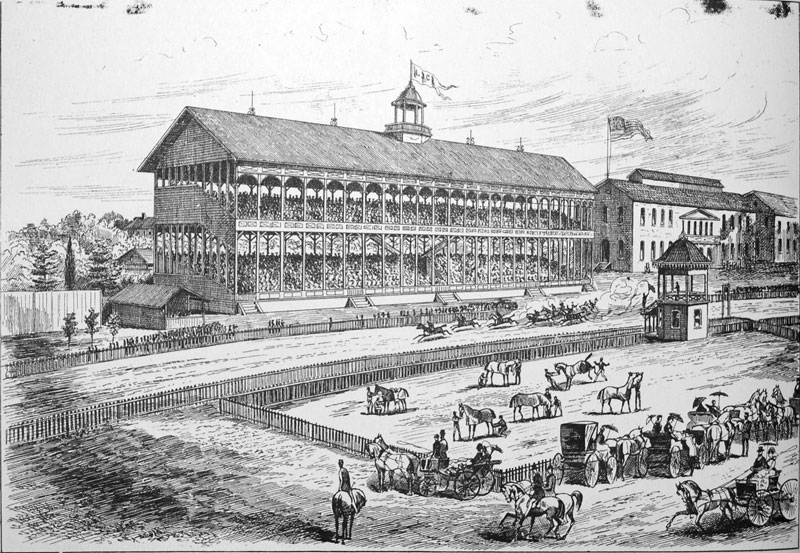Horse racing in North America began almost as soon as Europeans settled the colonies. The first racetrack, called the New Market, was established in 1665 near the site of the present-day garden city of Long Island in New York. Tracks rapidly developed wide appeal among the citizens, and horse racing spread along the Atlantic Coast quickly.1 By the time of the American Revolution, horse racing had already become popular in almost every colony. Moreover, it was moving well into the newly settled areas of the Southwest. Andrew Jackson was a founder of the first racing track in Nashville, Tennessee, in the early nineteenth century. By the 1800s, Kentucky had eight racetracks, due to its native bluegrass being recognized as ideal for grazing horses.2

Horse racing becomes much more important when we analyze life in early American society. Like almost everything else in the life of early America, the world of horse racing was separated by strong lines of class and race.3 For many years, it was considered the exclusive enjoyment for the rich gentleman. In 1674, a court in Virginia gave a fine to James Bullock, a tailor, who proposed a race. It was against the law for a laborer to make a race, and according to the court, horse racing was a sport exclusive to only rich gentlemen. While aristocrats retained control of racing, they were not the only people who participated. Southern aristocrats often trained young male slaves as jockeys for their horses, and northern horse owners employed the services of free blacks as riders. In America, African Americans eventually emerged as some of the most talented and experienced trainers of racing horses. Horse racing became very popular among the public. Despite social and legal pressures, free blacks and poor whites often staged their own informal races.4
Racing also reflected the growing sectional rivalry between the North and the South. In 1824, the Union Race Course on Long Island established an astounding $24,000 prize for a race between two famous thoroughbreds: American Eclipse from the North, and Sir Henry from the South. Surprisingly, the race between Eclipse and Sir Henry was America’s first national event.5 Eclipse won two of the three heats, but Sir Henry prevailed in another such celebrated contest in 1836. These intersectional races, which drew enormous crowds and created tremendous publicity, continued into the 1850s, until the North-South rivalry began to take a deadly turn.6

Horse racing remained popular after the Civil War, but two major developments changed its character considerably. The first development was the successful effort to drive African-Americans out of the sport. At least until in the 1890s, black jockeys and trainers remained central to racing. At the first Kentucky Derby, in 1875, fourteen of the fifteen horses had African American jockeys. Isaac Murphy, a black man, won a remarkable 44 percent of all races, including three Kentucky Derbies. Gradually, however, the same social dynamics that enforced racial segregation in so many other areas of American life penetrated to horse racing as well. By the beginning of the twentieth century, white jockeys and organized jockey clubs had driven almost all black riders and many black trainers out of the sport.7
The second change was the introduction of formalized betting in the sport. In the late nineteenth century, racetracks began creating betting systems to lure customers to the races. Race horses were moving into the hands of enormously wealthy families, and the audience for racing was becoming increasingly working class and lower middle class. The people who now came to tracks were mostly white men, and some white women, who were lured to the races not by the love of horses, but by the usually futile hope of quick and easy riches through gambling.8
As soon as the horse racing ideology was offered to the American society, the public showed great affection. Horse racing has become known as one of the most popular sports in America. Over time its development exposed the changes American society has gone through. Horse racing is still popular in America today, so popular in fact that a three famous races, the Kentucky Derby, the Preakness Stakes, and the Belmont Stakes, known together as the Triple Crown, are still held every May and June.
- Alan Brinkley, American History: Connecting with the Past Volume 2, 15 edition (New York: McGraw-Hill Education, 2014), 156. ↵
- Richard Locker, “Will horse racing and betting make a comeback in Tennessee?” Commercial Appeal, accessed December 6, 2016, http://archive.commercialappeal.com/news/government/state/will-horse-racing—-and-betting-on-them—-make-a-comeback-in-tennessee-327f1df7-521b-7209-e053-010-379234621.html. ↵
- Brinkley, American History: Connecting with the Past Volume 2, 15 edition, 156. ↵
- Brinkley, American History: Connecting with the Past Volume 2, 15 edition, 156. ↵
- Henry Cecil, The Racing Post: A Great Knight (London, Business Insights, 2011), 2. ↵
- Cecil, The Racing Post: A Great Knight, 2. ↵
- Brinkley, American History: Connecting with the Past Volume 2, 15 edition, 156. ↵
- Brinkley, American History: Connecting with the Past Volume 2, 15 edition, 156. ↵



77 comments
Faisal Alqarni
Horse racing has always been something I like and follow when I can I watch Derby’s from Middle East, Europe and the U.S. Your article with its very lively illustrations is informative of two things; these are the rich history of horse racing in America and one of the reasons for the beginning of the cold relations between the South and North in the early days of America’s formation. I was very intrigued to learn of the law against poor people setting horse races and I feel this it was one of the ways in which development of classism it started.
Teresa Valdez
I never knew that horse racing was so deeply embedded into our culture. It is so messed up that prejudice pervaded these games so deeply. I really admire that despite being pushed away in the beginning, lower classes still pushed to be allowed to enjoy the races alongside the wealthy. The article does a great job of portraying how the sport evolved along with the country.
Justin Sassman
Nice article about horse racing to think that it launched and spread trough the colonies in america and probably beyond so quickly. An interesting bit of information was that even though slaves and free African Americans were some of the best trainers and jockeys yet they were later driven out by white jockeys. Also to think that the north and south rivalry spilled into the race track and started the first national event for horse racing.
Nahim Rancharan
It is interesting to see how an American favorite, such as Horse Racing, is deeply rooted in history. Before reading this article, I thought that Horse Racing was a more recent development. Moreover, it is interesting to see that this sport has European roots. In addition to this, this article does a great job at capturing both sides of a famous sport. The fact that it was originally only attended by wealthy gentlemen, and although it became more lenient over the years, it served as a way of separating the White from the African-Americans. Although the sports has made so much progress in more recent years, making it available to people of all races, ethnicities and genders, it is important to realize the history behind it. This article does a fantastic job at capturing the history of American Horse Racing from the 1600’s to present day. Good Job!
Cesar Zavala
Great facts about the history of horse racing, before reading this article I believed that this sport was, at least in the past, only to be enjoyed by rich white men. It was a surprise to find out that African-Americans played a huge part in the sport either as jockeys or horse trainers. I’ve yet to see a horse race in person but I would definitely enjoy watching this sport with such an interesting history.
Irene Astran
It is interesting to see the shift in the sport from being an exclusive sport enjoyed only by the upper class to being inclusive of the working and lower middle class now. I never knew that African American slaves had dominated the sport for so long. I appreciate that you started the article from their contribution to this history. Your information had a nice flow.
Hayden Hollinger
I have always been interested in horse racing in America because it does not seem to be very popular whereas back home in the UK it is a very popular sport for people to place bets on. I found this article interesting to realise that it was very much the Europeans influence which started horse racing in North America. The author does a great job of describing the early days of the sport as well as the major changes which occurred early on.
Lianna Ybarra
I think it is really cool to see how this sport has evolved through American society. I knew that it had started out as a “rich man’s” sport but it is interesting to see how it has evolved to today. Yes, the races are open to anyone but at the same time I feel like it is still pretty much aimed at the higher class in America.
Sam Vandenbrink
This article is very informative on how thee United States has been serrated by class for so many years. especially in the early United States, but it is funny to see that our society isn’t learning for its past mistakes separating class. I thought it was crazy that race was brought into horse raising, although it could have been expected because of the other problems they were having in society with race at the time. Learned allot from this article! Well done!
Priscilla Reyes
I really liked this article because it was truthful, and showed American racing in the beginning of history as well as in our current society. I thought it was crazy how even though blacks raced and were good at what they did, they were later taken away from this sport. To me, it seems as horse racing is still for the rich today. Betting continues and only those with good income can afford such a luxury. Nevertheless, I imagine it is a fun sport and despite its racist and elitist history, it is an American leisure activity that looks like a lot of fun.